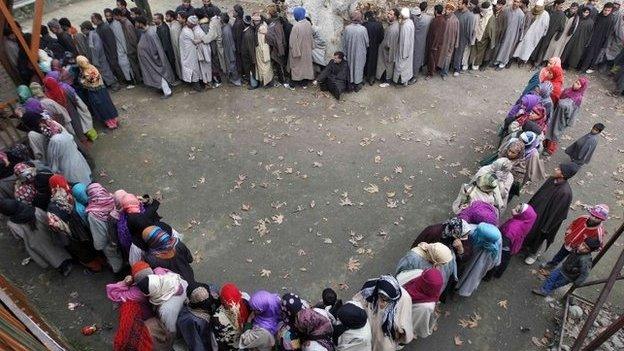Kashmir: Can new government provide healing touch?
- Published
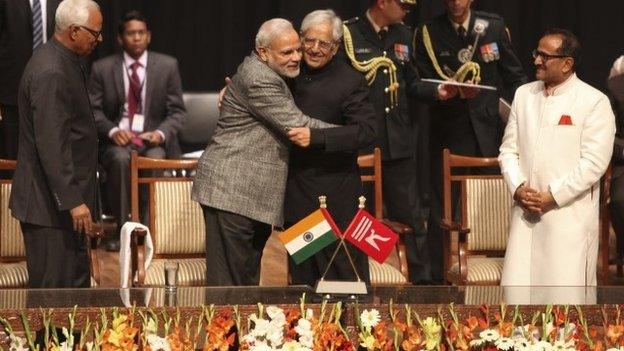
Prime Minister Narendra Modi attended Mufti Mohammed Sayeed's swearing-in ceremony in Jammu on Sunday
The alliance between India's ruling Bharatiya Janata Party (BJP) and the regional People's Democratic Party (PDP) to govern Indian-administered Kashmir is the most hopeful development in the region in a quarter of a century, writes Professor Sumantra Bose.
The anti-India insurgency that erupted in Kashmir in 1989 has abated over the past decade, but the situation remains fragile and volatile - the Kashmir Valley, in particular, remains beset by simmering unrest.
The state is home to about 13 million of the disputed territory's 18 million people; the rest live across the heavily militarised Line of Control (LoC) in Pakistani-administered Kashmir.
The Kashmir conflict has three main dimensions:
the sovereignty dispute between India and Pakistan as both claim the region in its entirety
the estrangement of the Kashmir Valley's population from India
the differences between the Muslim-majority Kashmir Valley and Hindu-dominated Jammu region
The BJP-PDP agreement offers the potential to apply the healing touch to the second and third dimensions.
At odds
On paper, the two are very unlikely coalition partners.
Since its formation in 1951, the BJP has maintained a hardline stance on the Kashmir issue and has stood for the repeal of Article 370 of India's constitution which grants special autonomous status to the state.
The PDP accepts that Kashmir is a part of India but has based its politics on articulating the valley's grievances and aspirations.
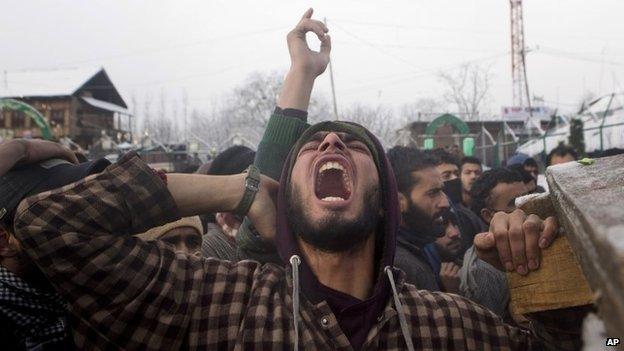
Violence has decreased over the past decade, but the Kashmir Valley remains beset by simmering unrest
It has not only defended Article 370 but - given that the state's statutory autonomy has been stripped away since the mid-1950s by integrative measures unilaterally imposed from Delhi - advocated renewed "self-rule" for Jammu and Kashmir, plus cross-border ties with Pakistani Kashmir.
The PDP has also campaigned on a human rights agenda, especially against the Armed Forces Special Powers Act (AFSPA), which gives virtually unlimited powers and immunity from prosecution to army personnel in Kashmir.
The party also advocates dialogue with pro-independence and pro-Pakistan groups and leaders in Kashmir and with Pakistan to find a lasting solution to the Kashmir conflict.
All these demands are at odds with the Hindu nationalist perspective on Kashmir.
Tough negotiations
Last May the BJP, led by Prime Minister Narendra Modi, won a decisive victory in India's general elections and a majority in the Lok Sabha (the lower house of the parliament), the first time this has happened since 1984.
In December, Jammu and Kashmir state elections saw a good voter turnout of 65% and threw up a complex, fractured result - the PDP dominated in the valley and emerged as the single-largest party with 28 seats and the BJP was a close second with 25 seats due to a dominating performance in the Jammu region.
The formation of the PDP-BJP government - in which Chief Minister Mufti Mohammad Sayeed, a 79-year-old political veteran, and nearly two-thirds of the ministers with full cabinet rank are from the PDP - followed two months of hard negotiations.
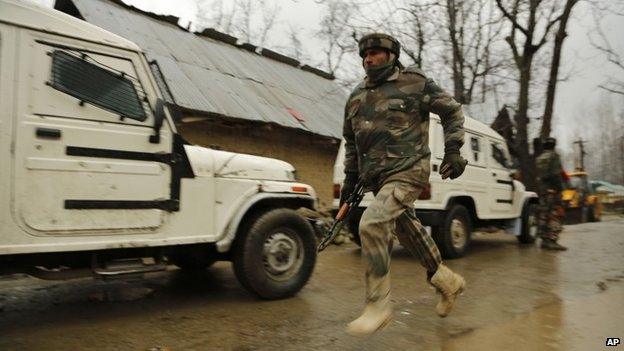
The coalition partners have differing views on the presence of security forces in the Kashmir Valley
The talks signalled a hugely positive development: the engagement of the most hardline Indian position on Kashmir with a perspective rooted in the valley which advocates autonomy, dignity and rights.
On Article 370, "while recognising the different positions of the parties", the coalition agreement commits to maintaining "all the constitutional provisions pertaining to Kashmir including the special status".
On AFSPA, while noting that the "[two] parties have historically held different view(s)", the agreement observes that "the situation in the state has improved vastly" and "the coalition government will thoroughly review the security situation" and "the need for de-notifying disturbed areas" to "enable the government to take a final view on the continuation of AFSPA in these areas".
Beyond the rapprochement on the most contentious points, the agreement is significant for what it promises to do on a broader front.
"The purpose of this alliance," the agreement says, is "to catalyse reconciliation and confidence-building within and across the LoC", to "widen the ambit of democracy through inclusive politics", and to "create conditions to facilitate resolution of all issues".
So "the coalition government will facilitate and help initiate a sustained and meaningful dialogue with all internal stakeholders irrespective of their ideological views... [which] will seek to build a broad-based consensus on the resolution of all outstanding issues".
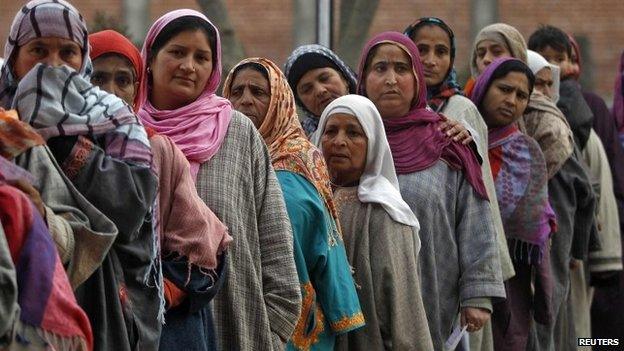
More than 65% of voters turned out to participate in the state assembly elections in December
Further, as "the government has recently initiated several steps to normalise the relationship with Pakistan, the coalition government will seek to support and strengthen the approach".
And, "the same [goal] will be pursued by enhancing people-to-people contact across the LoC [through] encouraging civil society exchanges [and by] taking travel, commerce, trade and business across the LoC to the next level".
This is precisely the kind of approach that eventually succeeded in ending the long conflict in Northern Ireland.
The symbolism of the oath-taking ceremony of the new Kashmir government - held in Jammu, the state's winter capital and a predominantly Hindu city - was powerful, as Mr Modi and Mr Sayeed embraced behind a table decorated with the Indian flag and the state flag. Hindu nationalists have long objected to Kashmir having its own flag.
It is premature to say that this strategic bargain between Kashmiri Muslim regionalists and Hindu nationalists heralds a Kashmir Spring. But it is unmistakably the most hopeful development since the descent into violence a quarter of a century ago.
The challenge over the next few years is to convert symbolism into substance, and the promise into reality.
Sumantra Bose is Professor of International and Comparative Politics at the London School of Economics and Political Science (LSE). His latest book is Transforming India: Challenges to the World's Largest Democracy.
- Published2 March 2015
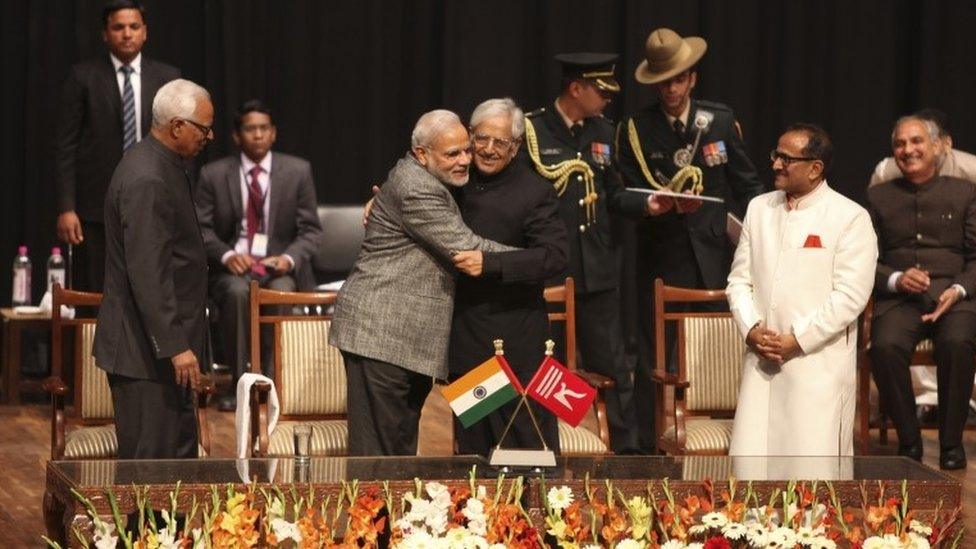
- Published24 February 2015
